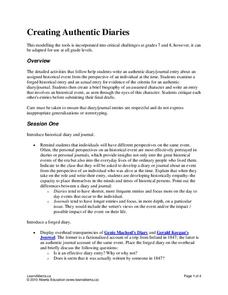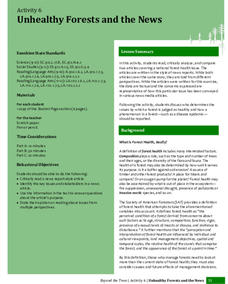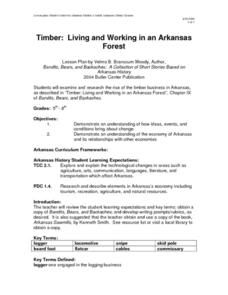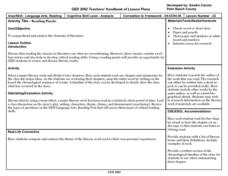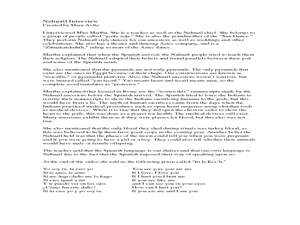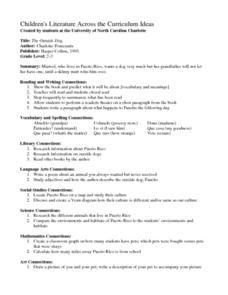Alberta Learning
Creating Authentic Diaries
Napoleon Bonaparte once said, "What is history but a fable agreed upon?" A series of lessons encourages learners to look beyond the basic fable agreed upon related to events in history and consider multiple accounts of the event. The...
University of Florida
Unhealthy Forests and the News
Everyone knows a tree makes a sound when it falls, but what do we know about dying trees? Class members learn background information about Laurel wilt disease from a teacher-led presentation. Team members work with partners to read and...
Curated OER
A Gift for Mama
Students read a novel about savings and complete activities to define short and long term saving goals. For this income and savings lesson, students read A Gift for Mama and answer discussion questions for it. Students define the terms...
Curated OER
The Viking Legends - In the Beginning
Students listen to a broadcast with two stories on a radio that deals with Viking legends: The Building of the Wall and a creation story similar to Genesis. They discuss each story, write a short scene from one of the stories and then...
Curated OER
The Higher Power of Lucky
Students complete activities using the book The Higher Power of Lucky. In this literature instructional activity, students read the story and identify the parts of the story. They create a wind chime like that found in the book.
Curated OER
Where the Wild Things Shouldn't Be
Students compare and contrast wild and domestic animal needs. In this animal welfare lesson, students read the poem Where the Wild Things Shouldn't Be and create a list of wild and domestic animals. Students create a short play or song...
Curated OER
Unicorns, Dragons, and Other Magical Creatures
Students exoplore the world of imaginary creatures (dragons, unicorns, etc.) They discuss the creature's special attributes and read stories about them. They create their own magical creatures in the form of puppets.
Curated OER
Crane, London, and Literary Naturalism
Students read London's "To Build a Fire" and Crane's "The Open Boat" and compare and contrast the authors' style as they explore the genre known as American literary naturalism.
Curated OER
Prince Ibrahima
Sixth graders read and utilize the facts from the story "Abd al-Rahmen Ibrahima" by Walter Dean Myers to analyze the main character's life which is ruined by conflict, jealousy, and greed. Journal entries are created in response to the...
Curated OER
Why Does the Cocoa Tree Need a Tropical Rainforest to Grow?
Fourth graders explore the requirements a cocoa plant needs to survive. They research where chocolate comes from and how humans can affect the growth of cocoa trees. Students create a 3-D model of a cocoa tree and compare and contrast...
Curated OER
Timber: Living and Working in an Arkansas Forest
Upper elementary and middle schoolers examine and research the history of the Timber Industry in the state of Arkansas. An economic component is quite prevalent in this lesson as well. Groups of learners work together to write essays...
Curated OER
The 1927 Flood
Upper elementary and middle schoolers examine the Great Flood of 1927 in the state of Arkansas. They each prepare an oral report about this flood and the huge impact it had on the economics of that time. Additionally, learners research...
Curated OER
Reading Stories in Art
Students study how artists tell stories using visual images by identifying and comparing elements of narrative (setting, characters, and plot) in a painting and a Greek vase.
Curated OER
Comparing and Contrasting
Students listen to the story "Bloomers" and discuss the differences between men and women in the past. They chart their guesses about women's rights in history.
Curated OER
Reading Puzzle
Twelfth graders examine the elements of literature. They each read a chapter of a novel, sequentially list the main ideas, present a summary of the chapter to the class, sequence the events, and review the novel by summarizing the timeline.
Curated OER
Four Folk Tales About HYO: The Confucian Tradition of Filial Piety
Students explore the nuances of Confucianism. In this Korean society lesson, students complete jigsaw reading assignments on the Hyo. Students compare their own reverence for parents to that described in the pieces about Korea.
Curated OER
Read and Get Smart
Use the class textbook to read a full story about Martin Luther King, Jr. The class writes facts about him and outlines his life, then they read the author and illustrator summaries at the end of the story. They compare and contrast the...
Curated OER
Nahuatl Culture
Middle schoolers read stories, look at maps, and write journal entries to learn about the language and artwork of Nahuatl culture. In this Nahuatl culture lesson plan, students research the Nahuatl culture and present their findings.
Curated OER
Being in the Noh: An Introduction to Japanese Noh Plays
Students read a Japanese Noh play and discuss its structure and traditional characters. They choose a short myth and write a Noh play based on it.
Curated OER
The Outside Dog
Students observe the book, "The Outside Dog," and predict the events of the story. At the conclusion of the story, students act out various paragraphs from the book and write about specified characters. Additional cross-curriculum...
Curated OER
The Tale of Genji
Did you know that the world's first novel was written by a woman? Murasaki Shikibu's The Tale of Genji, was published in 1021. Class members research Eastern and Western cultures in the 10th and 11th centuries, view modern adaptations of...
Curated OER
Compare 2-D Shapes
Second graders examine the attributes of two-dimensional shapes. In this geometry lesson, 2nd graders play a game in order to identify two-dimensional shapes and to name them.
Curated OER
Compare 2-D Shapes
Second graders explore and analyze plane shapes. In this plane shapes lesson plan, 2nd graders evaluate shape attributes to classify shapes correctly. Students work in groups to create different shapes.
Curated OER
Confucianism
Students examine the beliefs and history of the religion by studying mythology and sayings. They compare the beliefs of Confucian culture to American culture and share their information as class by an informal teacher lead discussion.


